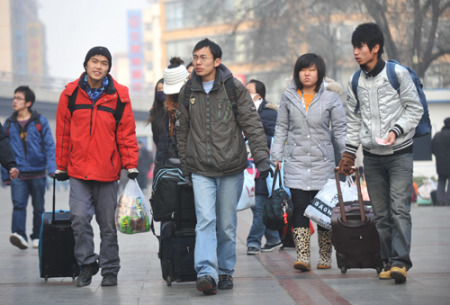|
|
双语阅读:大一新生寒假美梦的破灭(图)大一新生们迎来了大学的第一个寒假。同学们期盼着和家人团聚,想念着家里那浓浓的温情。可是到家后,同学们却发现自己的热情迅速降温,烦恼也随之而来。对已经习惯校园生活,并向往自由的他们来说,父母的唠叨声(nagging)变得愈加刺耳。  放假了,同学们归心似箭
怀着盼望回家过年的心情,大一新生们在火车站排了几个小时队来买票。几天后,他们挤进一列拥挤的火车,想象着家中的美味和那些即将在到家后感受到的浓浓情意。基于这些,他们表示,回家再周折也是值得的。 Freshmen, eager to get home for the Chinese New Year, queue up at the railway station for hours. Days later, they squeeze into a crowded train and dream of the home-cooked meals and love they’ll enjoy once they arrive home. This, they say, makes all the trouble of getting home worthwhile。 但很多大一新生开始发觉自己的家不再像记忆中的那样。异地生活已使得他们接触到一种全新的,自由的生活方式。而在他们刚刚迈入家门几个钟头内,他们便开始怀念自由的生活。家务活以及唠叨的父母可能会使得同学们的寒假美梦破灭掉。 However, many freshmen come to find that home is not exactly how they remembered it. Living away from their parents has exposed them to a new life of freedom – one that within hours of arriving some begin to miss. Household chores and nagging parents are just a few of the things that can ruin students’winter fantasies。 “父母还是像对待高中生一样对待我。”山东大学大一学生,19岁的宋颖抱怨到。“每天我都是在他们的牢骚声中度过的。” “still treat me like I was in senior high,” Song Ying, a 19-year-old freshman at Shandong University, complained. “I get an earful every day。” 在离开湖北老家后的第一个学期中,宋颖很想家里的一切——从家常菜到公交车。她痛苦流涕,渴望能睡在自己家中的床上。于是,她一考完试就奔回家中,自以为一切还是老样子。但显然,她错了。 During her first semester away from her Hubei home, Song missed everything – from her parents cooking to the city bus. She cried and ached to sleep in her own bed. So, upon finishing her exams, she fled home, thinking everything would be just as it used to be. Boy, was she wrong。 现在,为了“挣脱所有的限制”,她整天都呆在朋友的家中。就像在学校时那样,她时不时地上网更新SNS社区中的好友资料,饭是有一顿没一顿地吃,觉是昏天黑地地睡。 Now, she spends entire days at a friend’s home to “avoid all the restrictions”. She logs online to update friends’ profile on SNS, skips meals and sleeps in – just like she did on campus。 而在北京交通大学大一新生罗瑞琪的家中,情况变得更加糟糕。与宋颖的行动不同,19岁的罗瑞琪决定挑战父母的规矩,来争取自己作为一个成年人的权力。 Things have been even more tense at home for Luo Ruiqi, a 19-year-old freshman at Beijing Jiaotong University. Instead of moving to a friend’s house, though, he has decided to challenge his parents’rules for his right to be an adult at home。 罗瑞琪说,当父母抱怨他在卫生间呆太久时,他觉得“受够了”便发了一通脾气。尽管对自己的态度深感愧疚,但他仍坚持认为自己已经长大,可以按自己的方式生活了。 When they complained about the amount of time he spent in the toilet, Luo said he decided “enough is enough” and lost his temper. He feels guilty about his attitude, but he still argues that he is grown up enough to live by his own rules。 “不管在哪,我只想过我自己的生活。”罗瑞琪说。 “I just want to live my own way of living, wherever I am,” said Luo。 应届毕业生们很了解宋颖和罗瑞琪的遭遇。王凯2008年毕业,现在北京工作。他表示,同学们应该珍惜这段和家人相处的时光,“尽量表现的好些。” Recent graduates like Wang Kai know what Song and Luo are going through. But Wang, who graduated in 2008 and now works in Beijing, says students should cherish the time spent with their family and “just try to be nicer。” 王凯说,第一次从大学回家时自己和他们表现得一样,但现在,在距家乡1500公里外的湖南,他对当初的举动懊悔不已。他现在意识到父母是出于好意。他说,回头想想,“过去大学时的生活方式真的很不健康。 Wang says he acted the same way when he first returned home from college, but now, living 1,500 km away from his hometown in Hunan, he regrets his behavior. He realizes that his parents meant well. And, looking back, he says that “the way of living that we got used to on campus is not that healthy anyway”。 同时,父母们要比你想的善解人意得多。“他们独自在异地生活,肯定特别艰苦。再说我之前也去过那儿。”罗瑞琪的父亲说。“我们只是想保证它们健康快乐。我们可能有时太多虑了。” Parents, meanwhile, are more understanding than you might think. “Living on their own in a strange place can be harsh –we’ve been there before,” said Luo’s father. “We want to make sure that they are healthy and happy. Sometimes maybe we just worry too much。” 对于和儿子之间矛盾,老罗笑了笑说,“这根本不是问题,再说他是我儿子;我们总是可以解决问题。” As for the tension that’s arisen between father and son, Luo senior laughed and said, “It’s not a problem at all – he’s my son; we work things out, always。”
企业服务 |
||||
